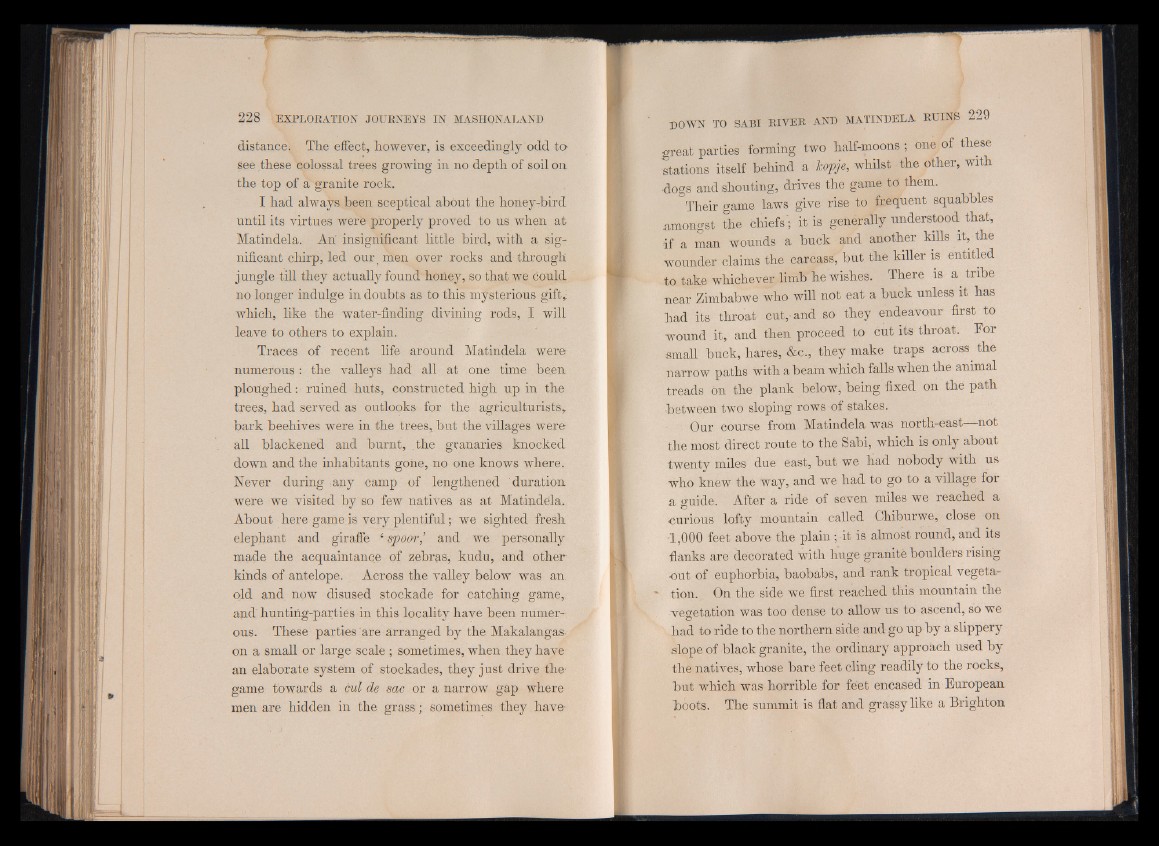
distance. The effect, however, is exceedingly odd to
gee these colossal trees growing in no depth of soil on
the top of a granite rock.
I had always been sceptical about the honey-bird
until its virtues were properly proved to us when at
Matindela. An insignificant little bird, with a significant
chirp, led our men over rocks and through
jungle till they actually found honey, so that we could
no longer indulge in doubts as to this mysterious gift,:
which, like the water-finding divining rods, I will
leave to others to explain.
Traces of recent life around Matindela were
numerous: the valleys had all at one time be,en
ploughed: ruined huts, constructed high up in the
trees, had served as outlooks for the agriculturists,
bark beehives were in the trees,, but the villages were
all blackened and burnt, .the granaries knocked
down and the inhabitants gone, no one knows where.
Never during any camp of lengthened duration
were we visited by so few natives as at Matindela.
About here game is very plentiful; we sighted fresh
elephant and giraffe ‘ spoor,’ and we personally
made the acquaintance of zebras, kudu, and other
kinds of antelope. Across the valley below was an.
old and now disused stockade for catching~ Ogame,.
and' hunting-parties in this locality have been numerous.
These parties are arranged by the Makalangas-
on a small or large scale ; sometimes, when they have
an elaborate system of stockades, they just drive the-
game towards a cul de sac or a narrow gap where
men are hidden in the grass; sometimes they havegreat
parties forming two half-moons ; one of these
-stations itself behind a kopje, whilst the other, with
dogs and shouting, drives the game to them.
Their game laws give rise to frequent squabbles
amongst the chiefs'; it is generally understood that,
if a man wounds a buck and another kills it, the
wounder claims the carcass, but the killer is entitled
t o t a k e whichever limb he wishes. There is a tribe
near Zimbabwe who will not eat a buck unless it has
had its throat cut,-and so they endeavour first to
wound it, and then proceed to cut its throat. Tor
small buck, hares, &c., they make traps across^ the
narrow paths with a beam which falls when the animal
treads on the plank below, being fixed on the path
between two sloping rows of stakes.
Our course from Matindela was north-east not
the most direct route to the Sabi, which is only about
twenty miles due east, but we had nobody with us
who knew the way, and we had to go to a village for
a guide. After a ride of seven miles we reached a
curious lofty mountain called Chiburwe, close on
1,000 feet above the plain ; it is almost round, and its
-flanks are decorated with huge granité boulders rising
out of euphorbia, baobabs, and rank tropical vegetation.
On the side we first reached this mountain the
vegetation was too dense to allow us to ascend, so we
had to ride to the northern side and go up by a slippery
slope of black granite, the ordinary approach used by
the natives, whose bare feet cling readily to the rocks,
hut which was horrible for feet encased in European
hoots. The summit is flat and grassy like a Brighton